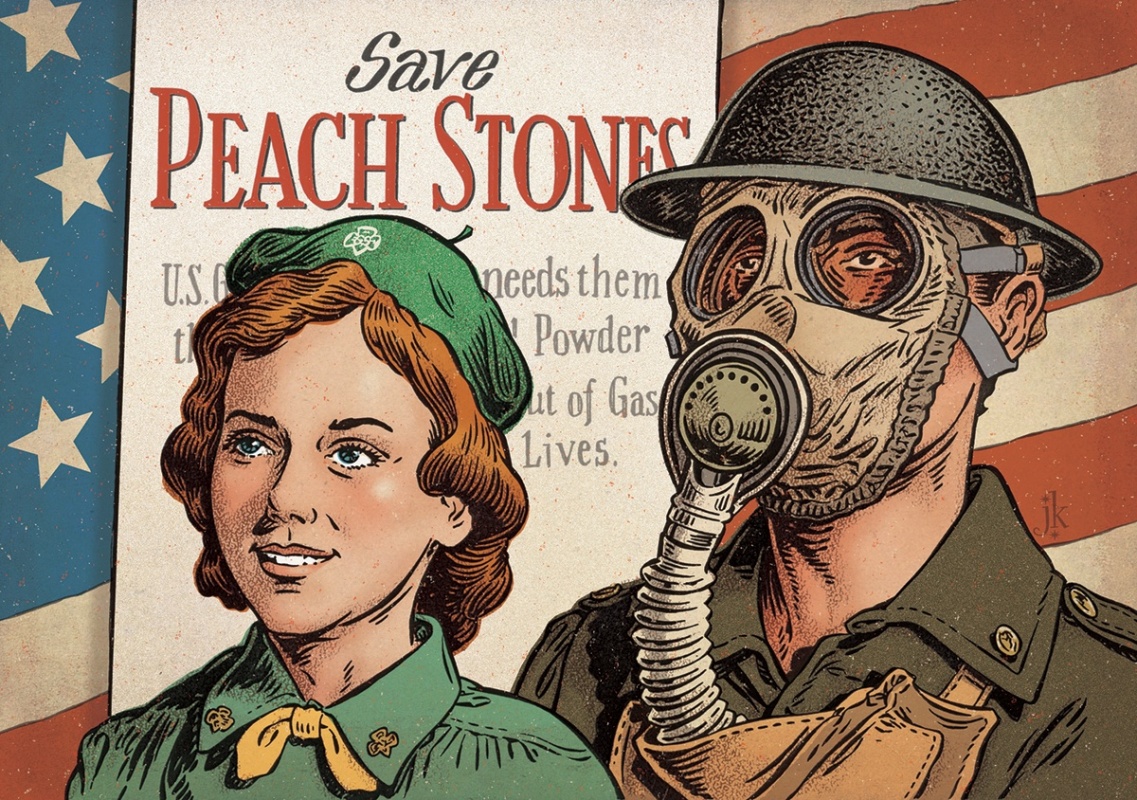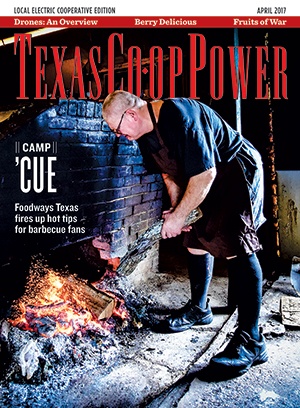A flood of patriotic Texans donned uniforms and leaped into the fray nearly 100 years ago when the U.S. entered World War I. Those who didn’t go overseas to fight joined the war effort at home, raising homing pigeons destined for the front lines, making bandages for the Red Cross and collecting peach pits. Peach pits?
Yes, these lowly fruit seeds, so plentiful in Texas, played a vital role in protecting Allied soldiers from poisonous gas.
World War I was the first conflict to employ the use of poisonous gases—initially chlorine, a yellow-green gas that drifted across the battlefield, causing death by asphyxiation. Later, phosgene and mustard gases were introduced.
Gas masks were issued to American soldiers at the front. These contraptions allowed the wearer to breathe through a fiber hose attached to a charcoal filter designed to capture gases. The masks were effective, even though the rubberized canvas faces were hot and restrictive and made the soldiers look like an army of mutant insects. Scientists continued to test new filtering processes, and gas mask manufacturers soon discovered a more effective replacement for the wood charcoal originally used.
“It has been found that the coal from the shells of certain seeds and nuts, among them cocoanuts [sic], chestnuts and horse chestnuts, as well as peach stones, has a much greater power of absorbing poisonous gases than ordinary charcoal from wood,” Popular Science Monthly reported in December 1918. “Cleaned, dried, and then subjected to a high temperature … the stones become carbonized, and the coal, in granulated form, is used as an absorbent in the manufacture of gas masks.”
During the final year of the war, the Gas Defense Division of the Chemical Warfare Service of the U.S. Army issued a call for Americans to save fruit pits. “Save Fruit Pits and Save Lives,” shouted a headline in the October 28, 1918, edition of the Temple Daily Telegram.
“Good charcoal will absorb as much as five hundred times its bulk of some gases,” according to National School Services, Volume 1. This newfound knowledge spurred Americans to set up local collection points to gather the peach pits. The government needed hundreds of millions of fruit pits (apricot, plum, cherry and olive pits also worked) to process into charcoal for packing gas mask filters. About 200 peach pits were needed to create enough charcoal for each filter canister.
Grocers and fruit stands in Temple, Belton, Bartlett, Killeen, Holland and Moffat displayed signs announcing collection points where folks could deposit peach pits for shipment to the government, according to a July 11, 2016, article in the Daily Telegram.
Schoolchildren gathered the pits from restaurants, hotels and bakeries as part of the reported 6,000 pounds shipped from Temple, where a local businessman donated a downtown warehouse for packing and processing the pits.
Nationally, the Girl Scouts and Boy Scouts got involved, bringing nutshells and fruit pits to 160 Army collection points. In the Girl Scout campaign, this rhyme appeared:
“Gather up the peach pits,
Olive pits as well.
Every prune and date seed,
Every walnut shell.”
The National Council of Boy Scouts in Temple offered a cash reward to the troop contributing the most pits, and Bell County set aside official Gas Mask Days to increase donations. “It is the duty of everyone,” reported the Daily Telegram in 1918, “that no fruits or nut shells lay unused.”
Despite the efforts during World War I, more than 90,000 soldiers died from toxic gases, and millions more suffered irreparable damage and debilitating health problems.
The Geneva Protocol in 1925 banned the use of chemical weapons in war. An international treaty banning the production, stockpiling and use of chemical weapons was ratified in 1997. It has been signed by 192 nations.
Today, Del Monte Foods sells peach pits as biomass to generate electricity.
——————–
Martha Deeringer, a member of Heart of Texas EC, lives near McGregor.


